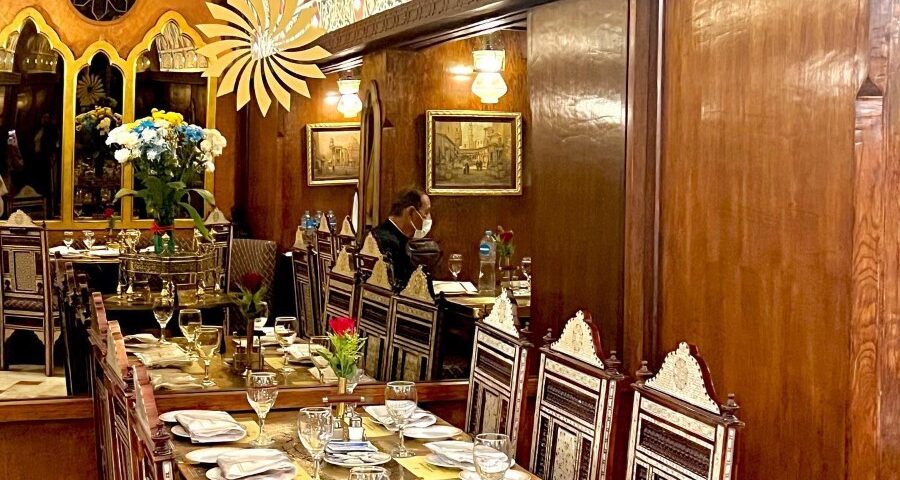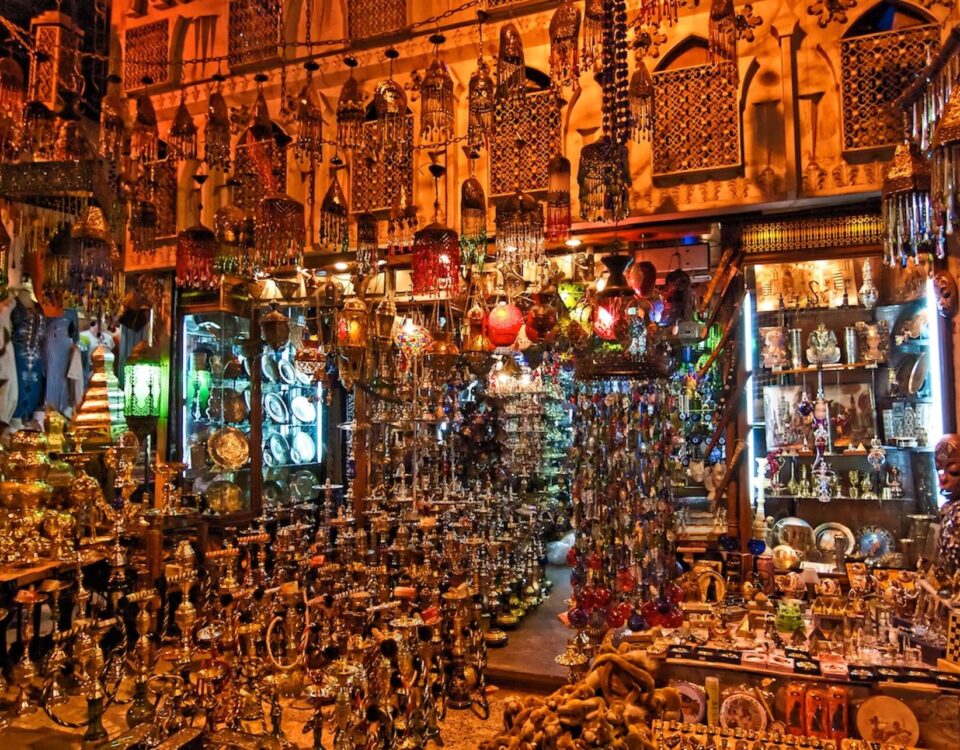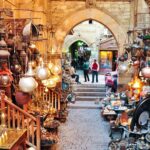
A Local’s Guide to Navigating Khan el-Khalili Bazaar Without Getting Lost
October 30, 2025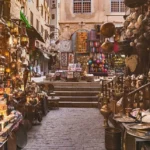
Unique Souvenirs You Can Only Find at Khan el-Khalili Bazaar
November 1, 2025Nestled in the heart of Cairo’s historic Islamic district, Khan el-Khalili is more than just a bustling bazaar filled with spices, jewelry, and souvenirs—it’s a cultural hub where time seems to stand still. For centuries, this iconic marketplace has been a gathering place for locals and travelers alike, and at its core are the charming Khan el Khalili cafes and tea houses. These spots offer a respite from the chaotic energy of the souk, allowing visitors to sip on aromatic mint tea, puff on flavored shisha, and immerse themselves in Egypt’s rich social traditions. Whether you’re exploring the narrow alleys lined with vendors or seeking a moment of tranquility amid the haggling, these cafes and tea houses provide an authentic taste of Egyptian hospitality. In this guide, we’ll explore the top cafés and traditional tea houses in Khan el-Khalili, highlighting their history, ambiance, and must-try offerings to help you plan your visit.
The Timeless Appeal of Khan el-Khalili’s Cafes and Tea Houses
Khan el-Khalili, established in the 14th century during the Mamluk era, has evolved into one of the Middle East’s oldest and most vibrant markets. Its cafes and tea houses are integral to this legacy, serving as social anchors where stories are shared, deals are struck, and daily life unfolds. Traditional Egyptian tea houses, known locally as “ahwas,” emphasize community and relaxation, often featuring strong Arabic coffee, herbal infusions like hibiscus (karkade), and water pipes filled with apple or mint-scented tobacco.
The bazaar’s cafes range from humble, open-air spots to more refined establishments, each offering a unique blend of nostalgia and flavor. As you wander through the labyrinthine streets, the scent of brewing tea and bubbling shisha will guide you to these hidden gems. Visiting during the evening, when the market lights up and live music fills the air, enhances the experience, though daytime visits provide a cooler, less crowded alternative.
1. El Fishawi Cafe: Cairo’s Oldest Ahwa
No discussion of Khan el Khalili cafes and tea houses would be complete without starting with El Fishawi Cafe, often hailed as the oldest in Cairo. Established in 1771 (or 1773, depending on the source), this family-run institution has been operating continuously for over 250 years, even remaining open 24/7. Tucked away in a narrow alley near the Al-Hussein Mosque, El Fishawi was a favorite haunt of Nobel Prize-winning author Naguib Mahfouz, who drew inspiration from its lively atmosphere for his novels. The cafe’s history is intertwined with the bazaar’s own, having survived revolutions, wars, and urban changes while maintaining its role as a social hub.
The interior is a feast for the eyes: ornate mirrors with carved wooden frames line the walls, creating an illusion of endless space; crystal chandeliers dangle from the ceiling; and Moorish tiles cover the floor. Patrons sit on wooden benches or chairs, often sharing tables with strangers, fostering a sense of community. The ambiance is chaotic yet enchanting—vendors hawk souvenirs nearby, waiters in traditional attire weave through the crowd, and the air is thick with shisha smoke and the hum of conversation.
Menu highlights include sweet mint tea, strong Turkish coffee, and cold hibiscus tea, perfect for Cairo’s heat. Shisha flavors like mango, apple, grape, or vanilla are must-tries, prepared expertly by the staff. Light snacks such as baklava or simple sandwiches complement the drinks. Prices are tourist-friendly but reasonable, with a tea starting at around 20-30 Egyptian pounds. Tip: Visit in the evening for live oud music, but be prepared for crowds and persistent touts—politely decline if uninterested.
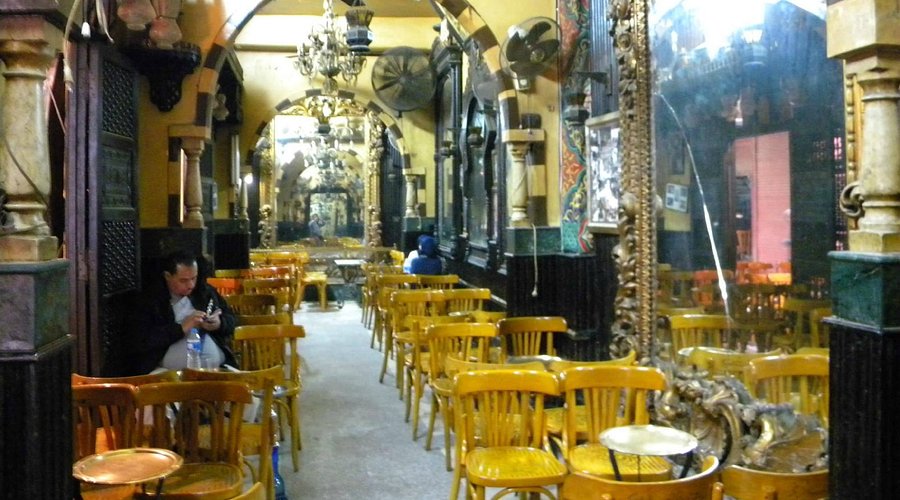
2. Naguib Mahfouz Cafe: A Literary Tribute
Named after the legendary Egyptian writer Naguib Mahfouz, this cafe is a sophisticated oasis within the bazaar’s frenzy. Originally a simple spot frequented by Mahfouz himself, it was revamped and reopened in 1989 by the Oberoi Hotels Group, blending Mamluk and Islamic architecture with modern comforts. Located at 5 El Badistan Lane, it’s adorned with photos of Mahfouz, titles of his books etched into the woodwork, and elegant arabesque designs that evoke 1930s Cairo.
The atmosphere is refined yet welcoming: air-conditioned interiors provide relief from the heat, with mirrored walls, ornate ceilings, and waiters in tarboosh hats adding to the charm. It’s less chaotic than El Fishawi, making it ideal for quiet conversations or reading. Live traditional music often plays in the evenings, enhancing the cultural vibe.
The menu fuses traditional and international flavors. Refreshing juices like lemon-mint, guava, or mango are staples, alongside Arabic coffee, chamomile tea, and non-alcoholic mocktails. For food, try hawawshi (spiced meat in pita), koshari (a mix of rice, lentils, and pasta), or baladi sausage sandwiches. Shisha is available with flavors like strawberry or menthol. Expect higher prices—around 100-200 Egyptian pounds for a drink and snack—but the quality and ambiance justify it. Reservations are recommended for dinner at the adjacent Khan El Khalili Restaurant.
3. El-Firdous: Traditional Flavors in a Charming Setting
For those seeking a more restaurant-like experience with cafe elements, El-Firdous stands out among Khan el Khalili cafes and tea houses. While details on its exact founding are sparse, it’s embedded in the bazaar’s fabric, offering a blend of dining and relaxation surrounded by the market’s sights and sounds.
The ambiance is authentic and lively, with outdoor seating that allows for people-watching amid the souk’s energy. It’s less about opulence and more about hearty, comforting Egyptian cuisine.
Signature offerings include flavorful koshari, succulent kebabs, and traditional teas. Pair your meal with shisha for a complete experience. It’s recommended for its affordability and genuine taste of local life, making it a great stop after shopping.
4. Bab al-Ghuri Tea Houses: Authentic Local Vibes
In the Bab al-Ghuri area of Khan el-Khalili, you’ll find clusters of traditional tea houses that embody the bazaar’s everyday charm. These unnamed or lesser-known spots, often lively with musicians and steaming kettles, date back to the market’s Mamluk origins and serve as communal gathering points.
The atmosphere is casual and vibrant—think outdoor benches, the clink of tea glasses, and the occasional live performance. They’re perfect for mint tea or karkade, with shisha adding to the social ritual.
These tea houses are budget-friendly and offer an unfiltered glimpse into local culture, ideal for travelers wanting off-the-beaten-path experiences.
5. Outer Square Cafes Near Al-Hussein Mosque
Overlooking the majestic Al-Hussein Mosque, the outer square hosts several casual cafes like El Dahhan and El Malky. El Dahhan specializes in grilled meats like kebab and kofta, while El Malky is famed for creamy rice pudding—a sweet end to your tea session.
These spots have a chaotic, authentic feel with shared tables and quick service. They’re not as historic as El Fishawi but provide affordable, flavorful options amid the bazaar’s pulse.
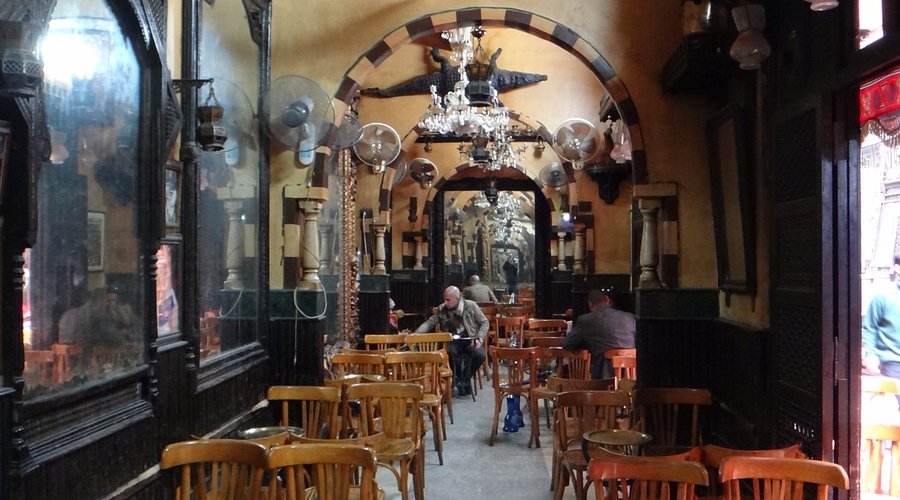
Tips for Visiting Khan el-Khalili Cafes and Tea Houses
To make the most of your experience, arrive via taxi or Uber to the main entrance near the Qalawun Complex, then navigate on foot. Bargain politely with vendors, and carry cash as cards aren’t always accepted. Best times are late afternoon to evening for cooler weather and vibrant energy. Respect local customs—no alcohol is served, and modest dress is appreciated. For semantic SEO alignment, pair your visit with bazaar shopping for spices or lanterns to complete the cultural immersion.
FAQs
What is the best time to visit Khan el Khalili cafes and tea houses?
Evenings are ideal for the lively atmosphere and milder temperatures, but mornings offer fewer crowds.
Are these cafes suitable for non-smokers?
Yes, many have non-shisha areas, and the focus is on tea and conversation. Ventilation helps in smoky spots.
Can I find vegetarian options in these tea houses?
Absolutely—dishes like koshari and fresh juices are widely available and vegetarian-friendly.
Is it safe for solo travelers?
Khan el-Khalili is generally safe, but stay alert to pickpockets and avoid unsolicited guides.
How much does a typical visit cost?
Expect 50-300 Egyptian pounds per person, depending on drinks, food, and shisha.
Final Words
Exploring the top cafés and traditional tea houses in Khan el-Khalili is like stepping into a living tapestry of Egyptian history and culture. From the timeless buzz of El Fishawi to the elegant serenity of Naguib Mahfouz, these spots offer more than refreshments—they provide a window into Cairo’s soul. As you sip your tea amid the bazaar’s symphony, you’ll understand why Khan el Khalili cafes and tea houses continue to captivate visitors worldwide. Plan your trip, embrace the chaos, and let the flavors linger long after you leave. Safe travels!

